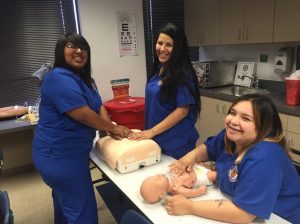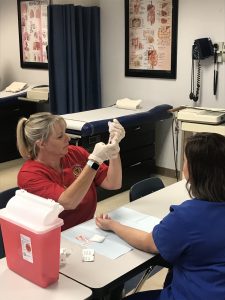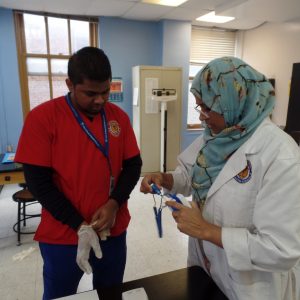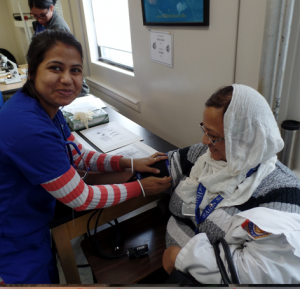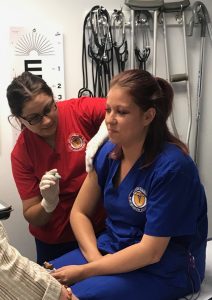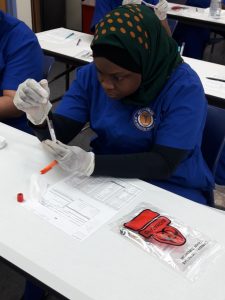Being Positive in School Can Make a Difference

Don’t let school get you down! Whether you’re frustrated with your performance or dreading your next exam, a positive attitude towards school can go a long way! Think about all the positive improvements an education can have on your life. Having a positive attitude increases your chances of better academic performance. The Allen School of Health Sciences knows how a positive attitude can brighten a student’s day and help them make the most out of their educational experience. We offer students seven steps for maintaining a positive attitude towards school.
Step #1: Think positively
Positive thinking is a powerful tool! You can succeed at school if you put in the effort and attitude that your education needs to thrive. Do you have a habit of thinking negatively? Your first step is to replace any negative thoughts you may have with positive ones. You can think about the positive aspects of what you have learned from a negative situation. Start by turning negative phrases into positive ones. Use these examples to help you turn your attitude:
- “I can’t” becomes “I can try”
- “I can’t learn this” becomes “Can you explain that again?”
- “I hate this class” becomes “This class is hard for me, but once I learn the material, I can appear more capable and knowledgeable.”
- “This is too much homework” becomes “The more I do my homework, the more knowledge I can gain.”
- “This teacher assigns too much homework” becomes “This teacher really wants us to learn how to succeed.”
- “I’m not smart enough to learn this” becomes “I can try and practice until I succeed.”
Step #2: Be proud of yourself
You can build a positive approach to school if you compliment yourself on your achievements no matter how small. Students learn new material every day. Remember to compliment yourself on the small achievements throughout your training program. When you do well on a homework assignment, congratulate yourself on a job well done. When you see yourself try, improve, or succeed in your technical skills or test scores, treat yourself to something you enjoy. Staying positive towards your skills and effort can help build your self-esteem and enhance your academic career.
Step #3: Share your positivity with friends
You may have friends with whom you complain about school. Sometimes our friends’ negative attitudes and frustrations bring down our own experiences. You may want to help them see the bright side of situations. Tell your friends that having a negative attitude towards school won’t help their situation. Show them how to use positive affirmations and comments to turn around their outlook on school. Let them know that staying positive towards school may help their education open doors to success. You can also move the topic to positive topics. If your friends or classmates are having trouble, organize a study group. Try to make friends with people who can positively influence you and your environment.
Step #4: Take a pause before reacting
It is helpful to maintain a positive and peaceful environment at school. Some people may complain constantly about tests or homework. Other people may get emotional during tense situations. Try not to jump to conclusions and stay level-headed. Catch yourself if you start complaining about a project or thinking the rules were better the old way. Take a pause and a deep breath before you react negatively. Instead, re-focus your reaction and give yourself time to react positively to the situation.
Step #5: Use the Golden Rule
Treat others as you would like to be treated. Being petty, aggressive, or mean to others only causes negative consequences at school. Don’t waste your time on toxic relationships. When you act kindly and treat others the way you want to be treated, you can make friends and surround yourself with positive energy. You will also need these traits in your professional career.
Step #6: Practice Gratitude
Showing gratitude helps you stay grounded and appreciate what you have in life. Make a list of positive aspects in your life, even if they are small. They can be as simple as enjoying a TV show or playing with your kids. Numerous psychological studies suggest that gratitude can improve your attitude towards life and improve emotional and physical health. What are you grateful for in life?
Step #7: Interact with the World Around You
Are you constantly plugged into your phone? Many of us use our phones for various reasons throughout the day and sometimes it can distract us from the outside world. If you spend the school day on your phone, you aren’t taking advantage of your education. Be present and prepared for school each day. Focus on learning, participating, and listening at school. You can become more passionate and engaged with your school work when you concentrate. You may like your studies more!
Do you think you have what it takes to become a medical assistant? If so, contact the Allen School today! We are currently enrolling for our summer classes and cannot wait for you to become part of the Allen School family. Visit www.allenschool.edu to learn more about a rewarding career as a medical assistant.
-Allen School

